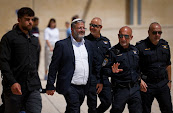Following is the text of the article
Iranian President, Masoud Pezeshkian finally selected a
cabinet that has disappointed voters and led to Javad Zarif’s resignation.
Zarif criticized the lack of young and diverse representation, casting doubt on
the future of Pezeshkian’s reformist agenda.
Pezeshkian submitted to parliament the names of his 19
cabinet members on Sunday, August 11, 2024. The list proved a disappointment
for many who had voted for him and also to his principal advisor, Javad Zarif.
Observers surmise that Pezeshkian had succumbed to the
preferences of the Supreme leader, Ali Khamenei, commanders of the IRGC, and
the conservative wing in parliament.
Zarif's
resignation
Pezeshkian had appointed Zarif as his vice president for
strategy, suggesting he would play the principal role in shaping Pezeshkian’s
program. Yet Zarif stepped down just 24 hours after Pezeshkian announced his
new cabinet. As the reformist newspaper Etemad wrote, the news of the
resignation of Zarif exploded like a bomb.
This
unexpected and intriguing, perhaps significant turn of events requires
explanation.
Zarif is a former foreign minister and lead negotiator of
the now-inoperative JCPOA nuclear agreement with the United States and the
European powers. During the campaign, he was always at Pezeshkian’s side and
served as his special adviser. Zarif, with his reputation as a moderate who
favors better relations with the US and the Europeans, remains popular with
moderate voters and reformists in the country. He almost certainly helped win
votes for Pezeshkian, who was not a familiar figure among voters.
Once elected, Pezeshkian appointed Zarif, the head of a
special advisory council, to suggest to the president potential cabinet
appointees. The council, after vetting a number of possible candidates,
presented its recommendations to the president-elect. But when Pezeshkian
announced his choices for cabinet offices, only a limited number were from the
list Zarif’s council had recommended.
Hence
Zarif’s resignation. His role as vice president had lasted only 11 days.
On Instagram, Zarif explained his resignation in terms of
the constellation of the new cabinet. He objected to seven members of the new
cabinet. The cabinet, he wrote, did not include more members of Iran’s new, younger
generation; it did not include, as he had hoped and the council had
recommended, women and representatives of minority communities. He was
“ashamed,” he wrote, that he had not adequately succeeded in the task he had
set for himself.
In a later conciliatory comment, Zarif said he had the
greatest affection for President Pezeshkian but felt that his presence would
have been a liability for the new president.
Pezeshkian, responding to his critics and the disappointment
among the voters, said only that they should wait to see how his cabinet
performs in practice.
The
Cabinet
During the campaign, Pezeshkian said he hoped to see better
relations with the US and European countries and to see sanctions lifted as a
means to improve the economy. That raised hopes he would appoint a moderate
cabinet inclined to reforms. The cabinet has turned out to be a mixed bag.
Abbas Araghchi, his nominee as foreign minister, is a
foreign ministry careerist and is seen as a moderate. He served as Iran’s
ambassador to Japan and Finland and deputy foreign minister. He was also
Zarif’s close ally as deputy chief negotiator in the JCPOA negotiations. If
confirmed by parliament, Araghchi will bring experience to the conduct of
foreign policy, a field in which Pezeshkian has none.
There is one woman in the cabinet: Farzaneh Sadegh, an
engineer nominated to be Minister of Roads and Urban Development. If confirmed,
she will be the second woman in the history of the Islamic Republic to serve as
a minister. The first woman was Marzieh Vahid Dastjerdi, appointed by President
Mahmoud Ahmadinejad as minister of health.
In two other key positions (which are both also subject to
the Supreme Leader’s approval), the president has named Esmail Khatib, a
cleric, to continue as the Minister of Intelligence. Khatib has close
connections to the intelligence community and is associated with the
suppression of dissent and the widespread arrest of journalists, intellectuals,
and political critics. He is a man trusted by the Supreme Leader and was earlier
head of his personal protection organization in Qum.
The Interior Minister will be Eskandar Momeni, the deputy
chief of police in the outgoing cabinet. Momeni was deputy chief of police
under President Raissi. The new president has also kept Mohammad Eslami as
chief of Iran’s civilian nuclear program—a post whose holder, we can assume, is
determined by the Supreme Leader. Eslami was sanctioned by the UN in 2008 for
being engaged in sensitive nuclear activities for the development of nuclear
weapons delivery systems when he was head of a defense industry research
institute. But during the campaign, he said he would work to revive the JCPOA.
Challenges
ahead
Pezeshkian may not have had a free hand in selecting the key
members of his cabinet. But the problems he faces are numerous and will require
intelligence and political savvy. Will he be able to reign in the police in
their harassment of women who don’t observe the hijab?
Can he persuade the security agencies (and the Supreme
Leader) to allow the people more freedom?
He inherits an economy where inflation is soaring, incomes
for many are inadequate to make ends meet, and widespread discontent
prevails.
Will he be able to make good on his campaign promise to
reach out to the West, to ease sanctions, and improve economic conditions?
The Gaza war, in which Iran’s proxies—Hezbollah in Lebanon,
Hamas in Gaza, and proxies in Syria, Iraq, and Lebanon—are involved and the
stand-off with Israel and the US after the assassination of Hamas leader
Haniyeh presents the new president with a thicket of problems. It remains to be
seen whether he has the skills to address them.






